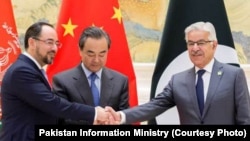Chinese diplomacy apparently has succeeded in persuading Afghanistan to begin a wide-ranging dialogue proposed by Pakistan for mending strained bilateral relations.
The decision came at Tuesday’s first trilateral talks Chinese Foreign Minister Wang Yi hosted in Beijing between his Pakistani and Afghan counterparts.
Last month, Islamabad shared with Kabul what it called an “Afghanistan-Pakistan Action Plan for Solidarity" (APAPS) for a “constructive and meaningful” engagement between the two countries. The proposed plan, officials say, would create working groups in politics, economics, the military, intelligence sharing, and issues related to Afghan refugees in Pakistan.
“There is a response now from our brothers in Afghanistan. I think things will start moving on the formation of the five groups on different topics entailed in this proposal and there will be progress on this proposal,” Pakistani Foreign Minister Khawaja Asif told a joint news conference at the trilateral talks.
Asif did not elaborate and credited China for the headway made on the proposed dialogue with Kabul.
“China is fully supportive of this effort and today during the discussions, it was part of our deliberations and this proposal is practically, if I may so, part of the dialogue, which took place today,” noted the Pakistani foreign minister.
Without directly commenting on remarks made by his Pakistani counterpart, Afghan Foreign Minister Salahuddin Rabbani praised Beijing for arranging Tuesday’s dialogue and said that China has “very good” relations with both Afghanistan and Pakistan.
“We are confident that China will play its role as an honest broker and someone that both countries [Afghanistan and Pakistan] believe and are happy to work with,” said Rabbani.
He added that Afghanistan will host the second round of the three-way meeting in the first half of next year “and we hope that we will make more progress.”
Afghan officials allege Taliban leaders are sheltering and using sanctuaries on Pakistani soil for orchestrating insurgent attacks. Islamabad denies the allegations and in turn blames Afghan intelligence operatives for harboring and supporting militants waging a deadly insurgency against the state of Pakistan.
The allegations and counter allegations have deteriorated bilateral relations particularly over the past three years.
Chinese Foreign Minister Yi, while discussing details of the meeting, noted that Pakistan and Afghanistan have agreed to improve their relations “as soon as possible.”
"The two sides unanimously expressed the point that they will not allow any party or force to use their territories to engage in the activities that would undermine the security of the other side,” Yi added.
At Tuesday’s talks, the three countries reiterated their call for the Afghan Taliban to join peace talks with the Kabul government “at an early date.”
The Chinese foreign minister also said Beijing and Islamabad want to work together with Kabul “in the spirit of mutual benefit” to extend their massive multi-billion dollar “economic corridor” to Afghanistan.
China is investing around $60 billion to build a network of highways, railways and power plants in Pakistan to link the two countries.
The China-Pakistan Economic Corridor or CPEC is a flagship project of Beijing’s Belt and Road Initiative of building infrastructure projects in dozens of countries in Asia and Europe.
“We hope that our three countries can work together to promote connectivity under the Belt and Road Initiative and contribute to regional development and prosperity,” Yi noted.
China hopes that improved economic conditions and stability in Afghanistan and Pakistan will discourage regional terrorism and ensure protection of the Western Chinese border region of Xinjiang, where militants from the mostly Muslim Uighur ethnic minority community are blamed for carrying out terrorist attacks.




